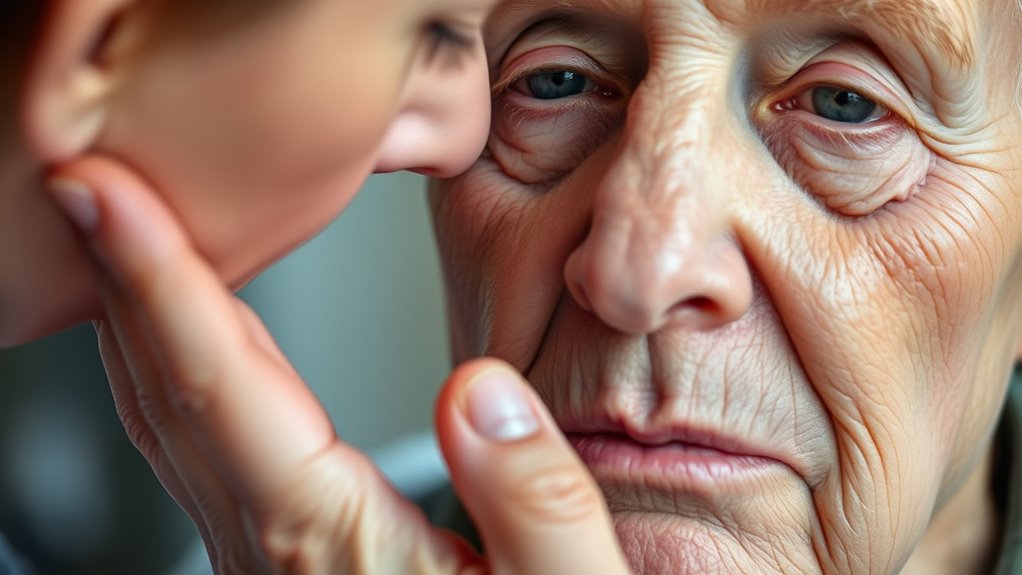As a caregiver, it’s crucial to notice early warning signs like sudden fatigue, unexplained weight changes, persistent coughs, or behavior shifts such as confusion or mood swings. Watch for sleep or appetite disturbances and physical signs like falls or injuries. Promptly addressing these signs can lead to early intervention and better health outcomes. Stay alert to subtle changes, and if you keep paying attention, you’ll gain more tips to protect those in your care.
Key Takeaways
- Monitor for sudden physical changes like fatigue, weight loss, or unexplained pain that may indicate health issues.
- Watch for behavioral shifts such as confusion, mood swings, or withdrawal that signal underlying problems.
- Be alert to persistent symptoms like coughs, sleep disturbances, or appetite changes requiring medical attention.
- Regularly check vital signs and use health monitoring tools to detect early signs of deterioration.
- Educate caregivers and family members on warning signs and encourage prompt intervention for better outcomes.

Caring for a loved one can be rewarding, but it also requires paying close attention to their health and well-being. One of your most important roles is recognizing early warning signs that might indicate health issues. The key lies in symptom recognition—being able to notice subtle changes or new symptoms that may signal a developing problem. This awareness allows you to seek medical attention promptly, which can make a significant difference in treatment outcomes. Preventive measures are equally essential; they help reduce the risk of illness and catch problems before they become serious. Regular check-ups, vaccinations, and maintaining a healthy lifestyle are foundational steps in this process. By staying proactive, you can help your loved one avoid complications and maintain their quality of life.
When monitoring your loved one, pay close attention to changes in behavior or physical condition. For example, sudden fatigue, unexplained weight loss or gain, or a persistent cough can be early signs of underlying health issues. Changes in appetite or sleep patterns are also important to note, as they often indicate something is amiss. Be vigilant about mental and emotional shifts, such as increased confusion, forgetfulness, or mood swings, which might signal neurological or psychological concerns. Recognizing these symptoms early can lead to quicker diagnosis and treatment, preventing the problem from worsening. Additionally, understanding vetted health products can support your loved one’s safety and well-being at home. Staying informed about symptom recognition techniques can further enhance your ability to identify issues promptly. Engaging with community resources and local healthcare providers can also provide valuable support and guidance.
Preventive measures go beyond just recognizing symptoms—they involve implementing routines that promote overall health. Encourage regular medical visits, which allow healthcare providers to screen for potential issues even before symptoms appear. Keep an eye on medication adherence, ensuring your loved one takes their prescriptions correctly to prevent avoidable complications. Promote a balanced diet rich in nutrients and encourage physical activity suited to their abilities. Maintaining good hygiene and managing chronic conditions like hypertension or diabetes through proper care are also fundamental preventive strategies. Incorporating health monitoring tools can further assist in tracking vital signs and detecting early warning signs, making it easier to respond quickly when needed. Recognizing the importance of early intervention can significantly improve health outcomes and quality of life for your loved one.
In addition, creating a safe environment can help mitigate risks. Remove hazards that could lead to falls or injuries, and install assistive devices if necessary. Educate yourself about common warning signs related to specific health conditions your loved one may have, such as stroke or heart disease. This knowledge boosts your ability to recognize symptoms early and act swiftly. Remember, the goal is to catch potential health issues at their onset, when they’re most manageable. Combining vigilant symptom recognition with preventive measures empowers you to provide the best care possible, ensuring your loved one stays as healthy and comfortable as possible.
Frequently Asked Questions
How Can Caregivers Differentiate Between Normal Aging and Health Problems?
You can differentiate between normal aging and health problems by paying attention to changes that go beyond typical aging milestones. Keep track of your loved one’s behavior and physical health, noting any new or worsening symptoms. Regular routine checkups help identify issues early, ensuring you catch problems before they worsen. If something seems abnormal or persistent, consult healthcare professionals promptly to determine if it’s related to aging or a health concern needing attention.
What Are Subtle Signs of Cognitive Decline Caregivers Should Watch For?
Cognitive decline can be like a shadow creeping in unnoticed. You might see early memory lapses, like forgetting appointments or familiar names, or subtle personality changes, such as increased irritability or withdrawal. These signs often slip past, but by staying observant, you catch them early. Watch for small shifts in behavior and memory—these are clues that your loved one’s mind might need a closer look before bigger issues arise.
How Often Should Caregivers Monitor for New or Worsening Symptoms?
You should regularly conduct symptom tracking and health check-ins with the person you’re caring for, ideally once a week or more if their condition changes. Consistent monitoring helps catch new or worsening symptoms early. Pay attention to subtle shifts in mood, behavior, or physical health, and record these changes. Staying proactive ensures you can seek medical advice promptly, providing the best support and care.
Are There Specific Warning Signs for Common Chronic Conditions?
Did you know that early symptom recognition can markedly improve outcomes for chronic conditions? You should watch for specific warning signs like persistent pain, sudden weight changes, or unusual fatigue, which are common indicators of issues like diabetes or heart disease. Recognizing these chronic condition indicators early allows you to seek timely medical help, manage symptoms effectively, and potentially prevent complications. Stay vigilant and attentive to any new or worsening symptoms.
What Steps Should Caregivers Take if They Notice Potential Health Issues?
If you notice potential health issues, you should act quickly by prioritizing emergency preparedness and medication management. Make certain you have a plan for emergencies, including contact numbers and access to medical supplies. Monitor medication schedules carefully, and consult healthcare professionals promptly to address concerns. Staying organized and proactive helps prevent complications, guaranteeing your loved one gets the right care when needed. Always stay vigilant and ready to respond effectively.
Conclusion
So, while you’re busy watching for those subtle signs, remember that sometimes the biggest warning signals are hiding in plain sight. It’s ironic how we often overlook the obvious while chasing after the small details. Staying alert might just save a loved one’s life, yet it’s easy to dismiss that persistent cough or sudden fatigue as nothing. Trust your instincts—because the smallest sign could be the loudest alarm you’ll ever hear.









